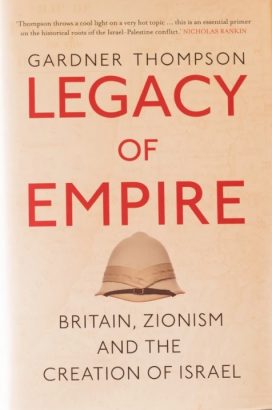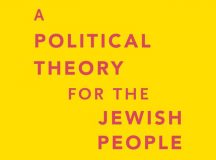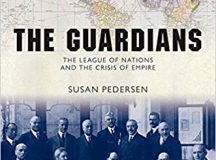A better title for this book would have been Original Sin: Britain’s Embrace of the Zionist Movement. In the view of the author, a historian of British colonialism in Africa, Britain’s decision to issue the Balfour Declaration in 1917 and subsequently enshrine it in the League of Nations’ Mandate for Palestine in 1922, laid the foundation for a good deal of the subsequent misery experienced by the peoples of the Middle East. If only Lloyd George had said no to Weizmann, Thompson laments. If only subsequent British officials had seen the light in time and reneged on Britain’s amorphous commitment to the Zionist movement. How and why it did not, and the way that matters subsequently unfolded during the Mandate years, is the subject of this book, which is directed at the general, non-specialist, reading public that is ‘both ignorant of the background to the still relevant Arab-Israeli conflict and eager to learn about it’ (just as he says he was).
The book is clearly situated within the contemporary debates in Britain regarding the Jewish communities perception of growing anti-Semitism in the Labour party and beyond, and the validity of conflating anti-Zionism with anti-Semitism. To be sure, Thompson says, it’s up to the parties to the conflict, Arabs and Israelis, to make peace. To that end, ‘it would help if Israel shed the poisonous claim that anti-Zionism – or criticism of Israel – is necessarily anti-Semitic; and if the Palestinians found a way of negotiating with one voice’, an equivalence that some may find bizarre – one could just as easily reverse the formula, namely, that ‘it would help if the Palestinians, particularly Hamas, shed its eliminationist, dehumanising anti-Zionist/anti-Semitic ideology, and if the Israelis found a way of negotiating with one voice’. But the author’s main focus is on Britain’s ‘historic responsibility’, making it ‘[best] qualified by history to help put the Balfour Declaration to rest […] shed stale partisanship and initiate a renewed search for justice and peace.’ What this would entail, in practice, he does not say.
Befitting the author’s focus on origins, one-half of the 300-page book covers the period between 1897-1922, and another 30 per cent up until 1939, by which time, he correctly states, the die had been cast. One interesting angle that is generally not present in the literature is the Irish context: just as post-World War One policy for Palestine was being formulated, the Irish War of Independence was being fought (1919-1921), resulting in the decision to partition Ireland. Subsequent official critics of Britain’s Palestine policy would point to the continuing Irish troubles post-partition, and wonder why the ‘correct’ conclusions –namely, devolution of power to the majority community, and maintaining the territorial integrity of Palestine – were not being drawn. To be sure, one may argue the relative merits of partition versus some other power-sharing formula within a unitary state, but as the subsequent failure of the latter approach in Cyprus demonstrates, there is never a one-size fits all solution to political conflict.
A more central aspect of the author’s argument is that other countries, led by the US, were guilty of nimbyism (an acronym for ‘not in my backyard’), referring to their unwillingness to solve the ‘Jewish question’, both before and after the rise of Nazism, by opening their doors to large-scale Jewish immigration. Such an unwillingness disturbed British policy-makers to no end, as they found themselves caught between a rock and a hard place as the plight of desperate Jews increased, while the Arabs in Palestine and in the region understandably resented plans to solve the problem at their expense (their own form of nimbyism not mentioned by the author, apart from a quote from an Arthur Koestler novel). Given the widespread anxieties and resulting demagoguery generated by present-day mass migrations of desperate refugees around the world, the discussion of nimbyism resonates loudly.
For those already familiar with the story, there is little new information, per se. But history writing is as much an art as a science, and the way that one marshals one’s facts to support a particular interpretation is the warp and woof of the profession. Knowledgeable people can hardly take issue with the author’s presentation of Zionism, in all of its varieties, as only one possible solution to the ‘Jewish question’, and that Zionism was a distinct minority movement within world Jewry right up until World War Two. There was nothing inevitable about Zionism’s success, and even the most fervently anti-British Zionists cannot dismiss Britain’s role in giving the Zionist movement the essential backing necessary to translate what had appeared to be a pipe dream into reality. But Thompson treads on more problematic ground when he dismissively labels Zionism as ‘eccentric’, and mobilises the Israeli anti-Zionist historian Shlomo Sand to emphasise that the Jews were (and are) not a nation, and that Zionism’s claim to be the national liberation movement of the Jewish people is specious. In doing so, Thompson ignores, willfully or otherwise, that modern national movements are not mere ‘inventions’ manipulated by interested parties but draw on older collective identifications, and emerge within particular contexts, contingent on a host of factors. It is certainly true that without Britain’s embrace of the Balfour Declaration, the Zionist movement may well have withered on the vine, but that in itself does not delegitimise it. Nor does the fact that it was a minority movement for decades – the initial task of nearly all national movements has been to persuade their target publics to join them. Parallel Arab national movements receive no such similar critical treatment in the book.
Thompson’s ‘if only’ approach included Arab-Jewish relations within Palestine: he presumes that the old Yishuv, particularly the Sephardi portion, would have continued live in a state of comity with its Arab neighbors had not political Zionism and large-scale Jewish immigration poisoned the well. Given the subsequent shortcomings of Arab nation- and state-building throughout the region, including the problematic treatment of ethnic and religious minorities, one can’t help but be skeptical.
Thompson has a number of heroes, to whom he refers repeatedly: the British Liberal Jewish Cabinet Minister Edwin Montagu who fiercely opposed the Balfour Declaration as posing a threat to his full acceptance into British society, predicted that Zionism would serve as a rallying cry for anti-Semites, and succeeded in having a clause included that British support for a Jewish national home in Palestine would not prejudice the rights and political status enjoyed by Jews in any other country; Sir John Chancellor, High Commissioner for Palestine in 1928-31, who saw clearly the irreconcilable nature of the Jewish and Arab communities’ competing needs and demands, while expressing exasperation with Britain’s ‘obtuseness and ongoing ties with Zionism that left the Palestinian Arab indigenous majority in a hopeless state’; and the British journalist Joseph Jeffries, who in 1939 forcefully argued the case for Arab Palestine. Herbert Samuel, a Zionist British Jew who served as Britain’s first High Commissioner, is also praised for recognising the inherent difficulty in creating a common, agreed framework in which the two communities could conduct their affairs without violence.
Thompson makes much of the fact that the formal terms of the Mandate favoured the Zionist project, leaving the Palestinian Arabs without the ability to develop a parallel Arab Agency. Like others, he laments the failure, ascribed to all sides, to establish a joint legislative council in which the Palestinian Arabs could bring their demographic weight to bear. At the same time, the evidence that he himself presents shows that Britain, from an early stage, was committed to the well-being and advancement of both communities, including the establishment of the Supreme Muslim Council, headed by Hajj Amin al-Husayni.
Thompson presents considerable evidence of the Palestinian Arab contribution to the dynamics of the conflict (their internal divisions andrefusal to make tactical compromises included), but places preponderant blame on Britain for not abandoning the Balfour Declaration by the end of the 1920s, when the consequences of doing so were still manageable. By the end of the 1930s, as he correctly quotes the historian Kenneth Stein, the Yishuv had established a formidable territorial nucleus, leaving Britain with few policy options other than prudence, epitomised by the 1939 White Paper that outraged the Zionists while not satisfying the Arabs. Indeed, Thompson notes that Britain had lost control of events by the early 1930s. And once the horrors of the Holocaust became known at the end of the war, the plight of the masses of Jewish survivors and the Zionist movement’s determination to force the issue left a war-weary Britain unable to stomach any more.
One can hardly disagree with his concluding words that ‘recognition of one people’s “history” does not exclude recognition of another’s’, and that ‘a prerequisite for moving towards reconciliation is sympathetic imagination, applied on behalf of all involved’. Nor can one disagree that the Palestinians were the primary losers of the 1948 war, a trauma which profoundly shaped their collective identity. But readers more sympathetic to Zionism and the State of Israel than Thompson will find it difficult to reconcile the above words with Thompson’s primary emphasis on Zionism as an essentially colonial project aimed at displacing the native population, a variation of more classic European colonial projects but not fundamentally at variance with it. His ‘sympathetic imagination’ simply does not extend to the proponents of Zionism as a Jewish national liberation movement. Political Zionism may have triumphed against all odds, but he clearly would have preferred a different outcome. Similarly, the pragmatic positions adopted by the Zionist and Israeli leaderships – from the acceptance of the 1947 UN partition plan, UN Security Council Resolution 242 in 1967, the peace treaties with Egypt and Jordan, and the 1993 Oslo Accords hardly alter Thompson’s calculus. At bottom, he gives greater weight to the ideological core of Zionism, with its implied, and not-so implied relegation of the non-Jewish inhabitants to secondary status, at best, than to actual behavior at key junctures.






































